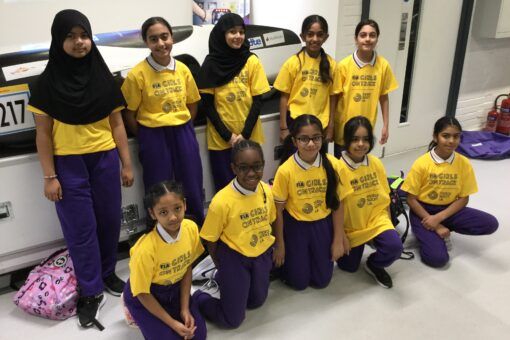
We’re celebrating International Day of Girls and Women in Science by looking at the work Ark is doing to broaden the horizons and raise the aspirations of young girls to develop a passion for the sciences.
This blog comes from Erika Nabeshima, Project Lead for Primary Careers Education, Information, Advice and Guidance.
Encouraging girls at an early age
The Organisation for Economic Co-operation and Development (OECD) found that gender norms were already strongly evident in job preferences at the age of five. This meant that children’s perceptions were confining which jobs they associated with a boy or girl.
In 2021, Education and Employers noted that in pre- and post-analysis of primary children aged six to 11 years old in England, participating in career-related learning helped children to reject stereotypes around gender equality and STEM (science, technology, engineering, and maths). It also increased confidence in the usefulness of school, and enhanced motivation to try their best.
While we welcomed the Department for Education’s recent announcement of a £2.6m careers education initiative, we had already started work on our primary careers strategy to inspire and inform our pupils about the world of work and routes into professional careers. This work is supported by a wealth of research highlighting the importance of beginning career education as early as possible to challenge ingrained stereotypical views.
As part of our Primary Careers Project, we are developing a framework that will raise aspirations and broadens horizons. Working in close collaboration with our primary schools, we are keen to ensure the project meets the needs of all our schools within the network. We are liaising with our regional directors and primary principals and will continue to work with specialist staff members across the network. The project will create more opportunities, like Girls on Track, for meaningful career experiences, as well as giving all Ark primaries access to a carefully curated bank of resources, ensuring that all pupils are well prepared for secondary school and the key choices they make in Year 9, Year 11, and Year 13.
To build a more equal, inclusive future, we need to start in the early years, and our project will ensure hundreds of children see the positive promotion of gender equality when they enter our schools.
Girls on Track case study
Girls on Track UK inspires young females to participate in STEM subjects and to enter careers in motorsport.
Ten Year 6 pupils from Ark Isaac Newton Academy went to UCL and participated in a ‘Girls on Track’ event. They met inspirational female engineers, performed a pitstop challenge, built a car and tested it on a racetrack. They also tried presenting in front of a camera and learnt some first aid.
One of the lucky students who attended this event was Maida, who said:
“Girls on Track was an amazing opportunity for me to discover that science is amazing. It really inspired me and gave me a wave of motivation to see so many females who are amazing at their jobs and the fact that science is all about having fun!”

Meet Kemi Anigiobi, who has taught chemistry, biology and physics at Ark Evelyn Grace for three years. She was recently featured in the Royal Society for Chemistry, where she shared her passion for the subject, which you can read here.